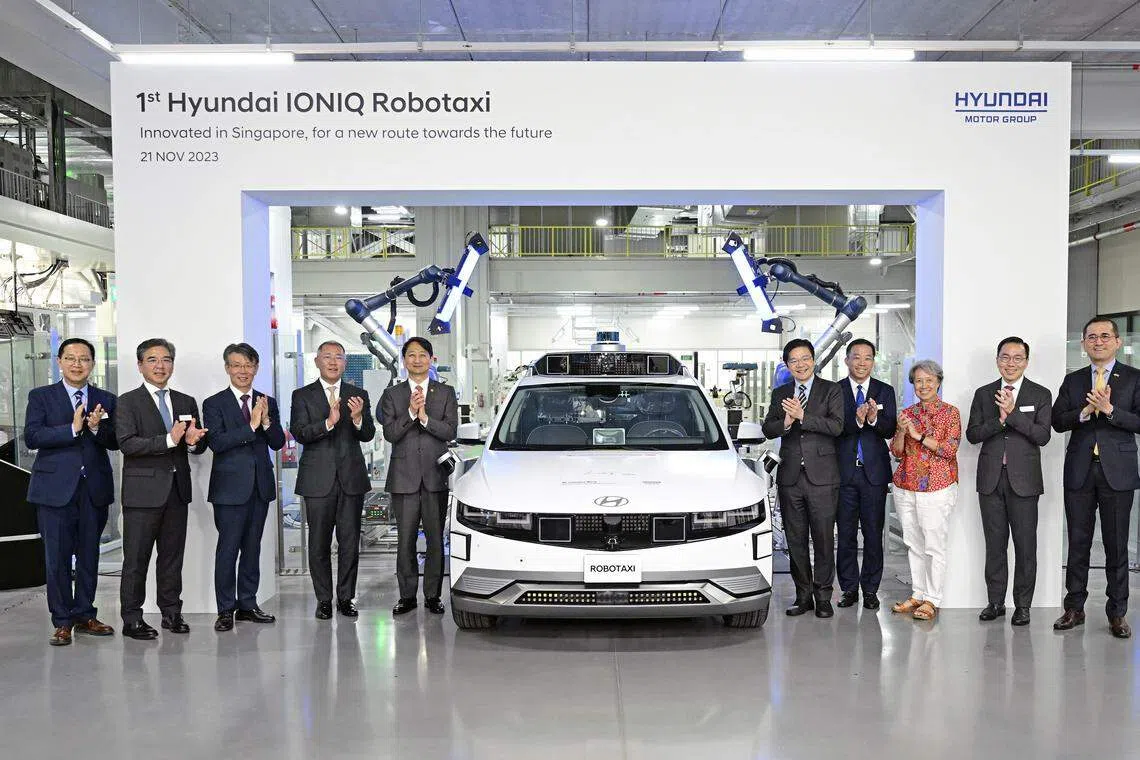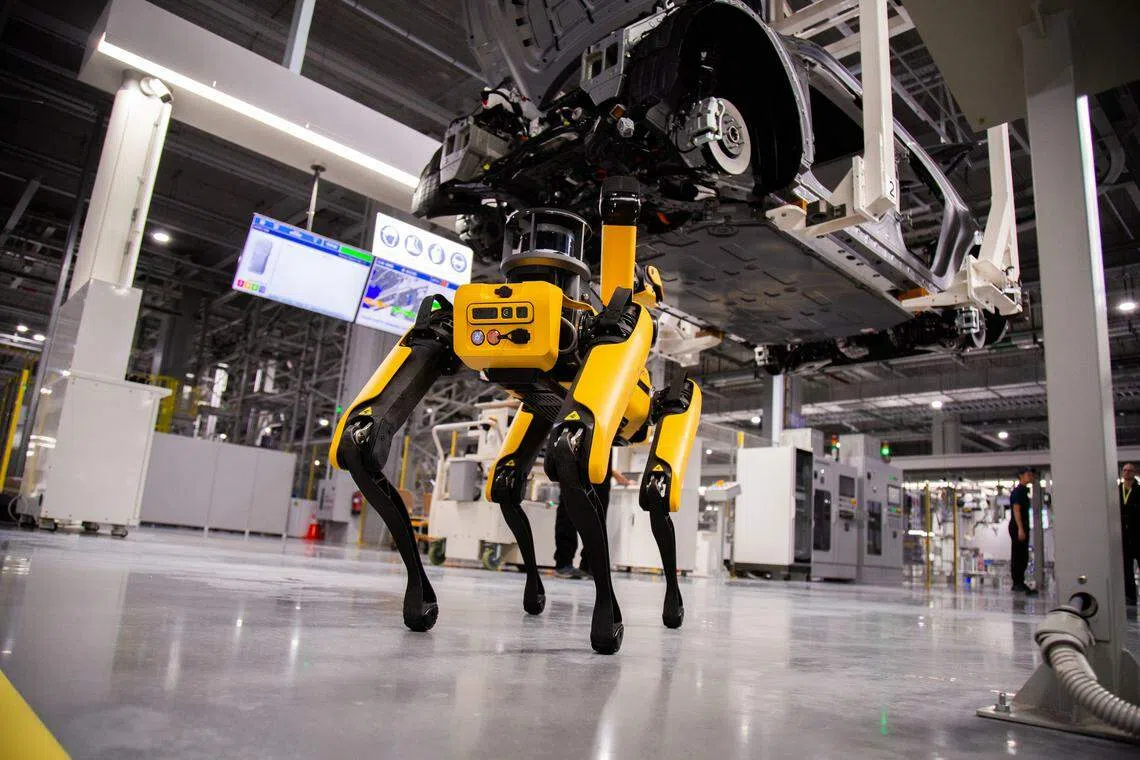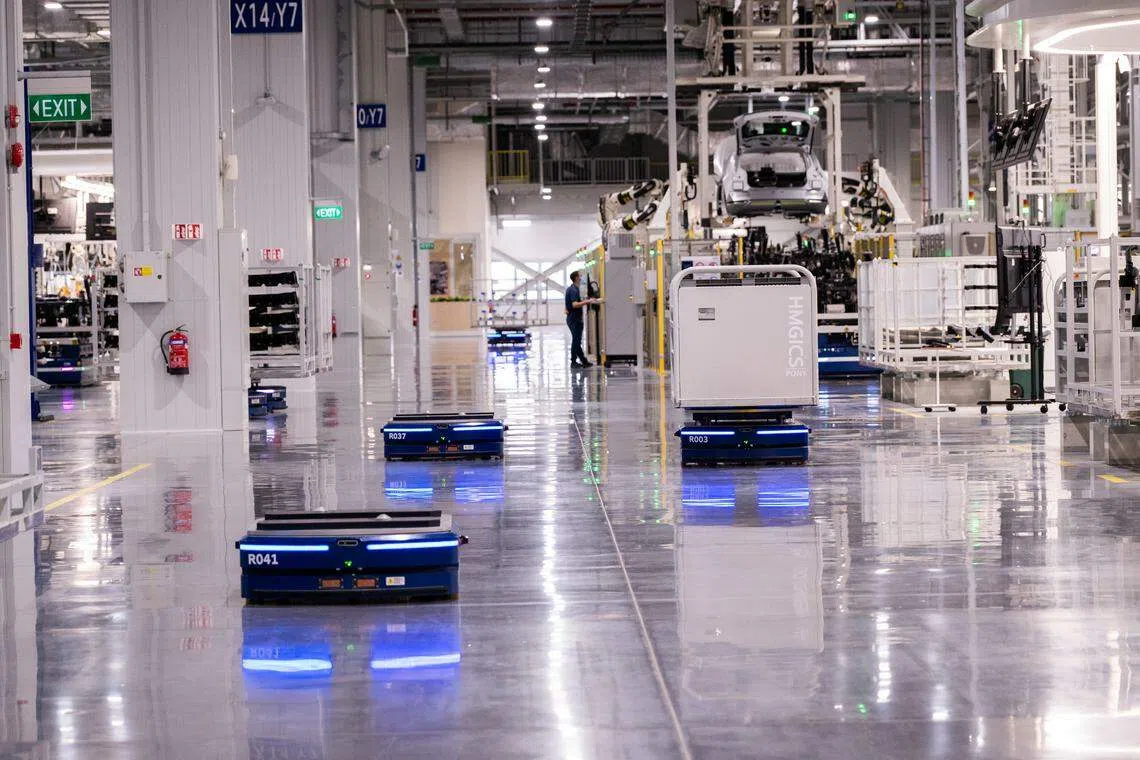New Hyundai facility in Jurong to research and build EVs – and possibly flying cars

Derryn Wong
AUTOMOTIVE giant Hyundai has opened a new facility in Singapore that will research new manufacturing techniques and build a range of electric vehicles (EVs) – possibly including flying taxis – in the future.
The Hyundai Motor Group Innovation Centre Singapore (HMGICS) was officially opened on Tuesday (Nov 21) at a ceremony attended by Deputy Prime Minister Lawrence Wong.
Located at Bulim Avenue within the Jurong Innovation District (JID), the seven-storey centre has 935,384 square feet of floor space and can produce up to 30,000 cars a year.
The production line has been operational since early 2023. It currently produces Hyundai Ioniq 5 EVs for the Singapore market, with deliveries of the first locally made model earlier this year. Next year, it will begin production of the Ioniq 6 sedan.

It also produces a fully autonomous version of the Ioniq 5 for US-based robotaxi company Motional. Hyundai Motor Group owns 50 per cent of Motional, in a joint venture with technology company Aptiv.
Hyundai did not comment on the cost of the facility, but industry estimates tag it at around S$400 million.
Navigate Asia in
a new global order
Get the insights delivered to your inbox.
Construction began in 2020 and was meant to be finished by 2022, but the process was delayed by the pandemic.
As a small-output factory, the centre is the most advanced automotive facility of its kind, said Park Jeonggyu, adjunct professor at the Korea Advanced Institute of Science and Technology, adding that it is not only a factory, but also a laboratory for researching the future of automobile production as well as a place for learning.
First of its kind

The centre is a smart factory, using automation, robotics and artificial intelligence, with 200 robots conducting 50 per cent of all tasks on-site, claimed Hyundai.
The production line is modular and has no conveyor belts, with robots moving parts between each module instead. Each module has around 300 sensors, with production data fed into a control system and a virtual model of the factory.
This does not just allow for monitoring, but also for improvements to be modelled before implementation.
As a result, it takes just weeks to rejig the production line to make different types of EVs, compared to months in a regular factory, said Alpesh Patel, the centre’s vice-president and head of its technology innovation group.
In the future, the Singapore factory could even produce vehicles other than cars, including personal mobility devices or air taxis, he added. “We want to be able to produce any type of mobility device... in one location and to be able to react to demand very quickly.”
Beyond manufacturing, the facility is Hyundai’s first “global innovation hub”, said Patel.
The centre is a hybrid factory and research facility where Hyundai will test new production methods, conduct market research, and build new vehicles based on that research.
The facility is unique as the first to combine these functions at such a scale, said Patel.
Parts of the centre will also be open to the public, in the name of customer engagement and research.

These include a virtual reality tour of the factory, a 618-metre rooftop test track for vehicles and an automated hydroponics farm. EV buyers will also be able to customise and take delivery of their car at the centre. (* see amendment note below)
Singapore’s JID a ‘natural’ choice
Hyundai’s decision to establish the centre in Singapore was influenced by the presence of many potential partners and the JID’s status as a hub for advanced manufacturing and technology, said Patel.
“We need open innovation... the JID is a place where smart manufacturing is taking place, where a lot of technology companies are coming in, so it felt quite natural for us to select (this) site,” said Patel.
Png Cheong Boon, chairman of the Economic Development Board, said: “The centre will further enhance our automotive and advanced manufacturing ecosystem by working with our institutes of higher learning, research institutes and businesses to develop and testbed new manufacturing technologies. We look forward to the new innovations it will bring in advanced manufacturing as well as the strong partnerships it will forge with our automotive ecosystem.”
At the opening, multiple memoranda of understanding (MOUs) were signed by Hyundai with various entities, including one with the Nanyang Technological University and Agency for Science, Technology and Research on creating a Corporate Lab for collaborating on transport.
Another MOU was signed with the Singapore Business Federation and Singapore Manufacturing Federation to co-develop manufacturing solutions, and yet another with PTC Logistics on establishing a hydrogen energy ecosystem in Singapore.
In 2022, JTC Corporation (JTC) and Hyundai signed an MOU for the joint development of transportation – including EVs and autonomous vehicles – for the JID.
“HMGICS’ decision to establish its innovation hub in JID, which is master-planned and developed by JTC, is testament of our efforts to develop an Industry 4.0 ecosystem, supporting Singapore’s Manufacturing 2030 strategy,” said Anil Das, director of JTC’s logistics and land transport cluster.
Manufacturing 2030 is the government’s 10-year plan announced in 2021 to grow Singapore’s manufacturing sector by 50 per cent of its S$106 billion value at the time.
* Amendment note: An earlier version of this story incorrectly stated that the rooftop test track was 650 m long. This is incorrect. It is in fact 618 m long. The article above has been revised to reflect this.
Decoding Asia newsletter: your guide to navigating Asia in a new global order. Sign up here to get Decoding Asia newsletter. Delivered to your inbox. Free.
Copyright SPH Media. All rights reserved.




